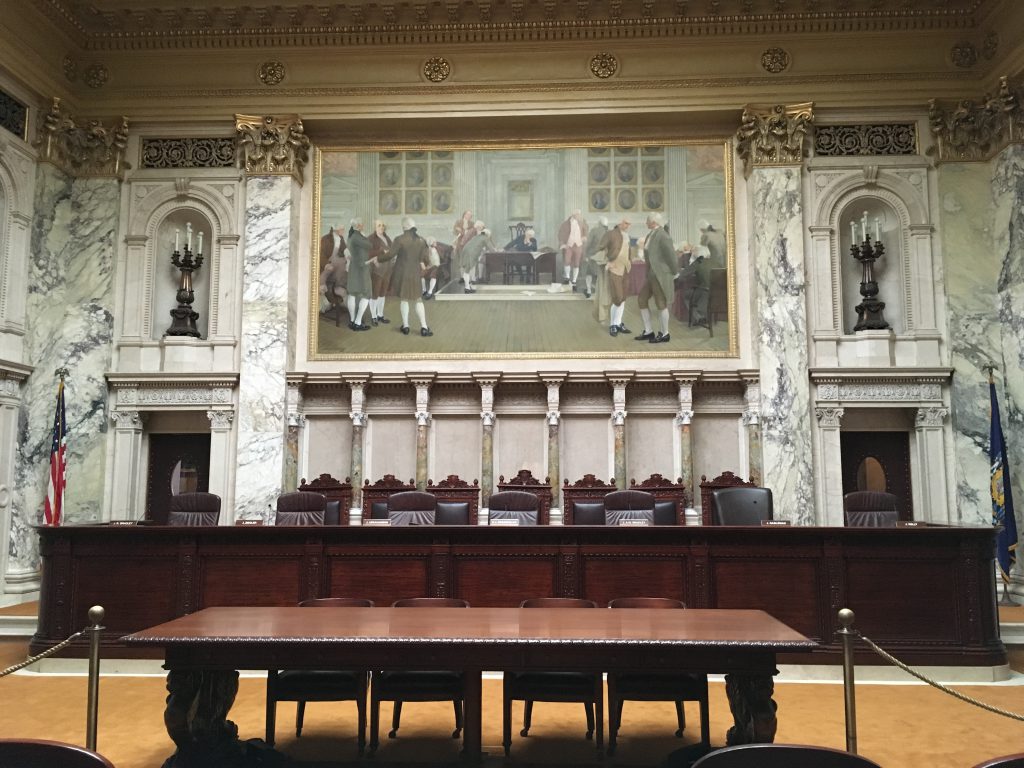How New Supreme Court Influenced Legislative Decisions
Everything important passed by the Legislature came after court gained a liberal majority.
With the Brewers opening the season against the Mets next week, let’s use baseball terms to score the 2023-24 session of the Wisconsin Legislature.
There were three home runs:
Passage of the 2023-25 state budget that included more aid for public and private schools that participate in the voucher program. A $500-million aid package that will upgrade the team’s American Family Field and keep the Brewers in Milwaukee until 2050. Dedicating one-fifth of future 5% sales tax collections to local governments, giving them the first meaningful increase in state aid in decades.
One run-scoring double:
Passage of major changes in how beer, wine and alcohol are regulated and sold, rewriting some laws passed after Prohibition ended in 1933. Wedding barn owners screamed foul, saying it forces them to apply for liquor licenses or go out of business.
A flurry of strikeouts:
Democratic Gov. Tony Evers vetoed Republicans’ three major income tax-cut packages that would have saved taxpayers $2 billion. Instead, Evers approved only small-ball income tax cuts that were part of the Republicans’ changes. And Evers and Republicans never agreed on how to spend $125 million set aside in mid-2023 to fight the growing contamination of water supplies by PFAS pollution. Plus, a failure to legalize medical marijuana, despite a February Marquette University poll showing 86% statewide support.
Everything changed in the Capitol in April of 2023, when Democrats, outnumbered in the Legislature, brought in their new star pitcher: Supreme Court Justice Janet Protasiewicz. The 10-year term on the court she won gave it a four-justice liberal majority for the first time in 13 years.
That new majority promptly threw a brushback pitch at Republican legislators: Let’s reconsider Assembly and Senate district boundary lines Republicans drew after the 2020 Census.
That pitch sent a message. “Yes, this same court approved those Republican-drawn boundaries less than two years ago. But that old conservative team’s playbook was thrown out.”
Republican lawyers struck out when they argued that the 2022 district lines should stay in place for this November’s elections. Instead, the new four-justice bloc told everybody – Republicans, Democrats and good-government organizations – to submit their own maps, which would be reviewed by two national experts.
Afraid that the maps ultimately ordered by the Court would be a walkoff win for Democratic candidates in November, Republicans voted to accept maps drawn by Evers, even though those new lines pose new challenges for dozens of Republican incumbents.
How important was the Protasiewicz election to what got passed in the Capitol? Everything important passed after that April 2023 vote. The shared-revenue deal became law on June 22, 2023; the new state budget on July 5, 2023, and new Assembly and Senate districts just one month ago.
But Republicans who controlled two-thirds of the Senate’s 33 seats perfected the beanball pitch this session. Republican senators continued to refuse to confirm – essentially firing – 21 Evers appointees to boards and commissions. Many had served on those boards, making important policy decisions. while their nominations were pending.
Some of those fired had long histories of public service. Democrat Barbara Lawton, who was tossed off the UW Hospitals and Clinic Authority Board, served for eight years as lieutenant governor. Dana Wachs, bumped from the Board of Regents that oversees the University of Wisconsin System, represented Eau Claire in the Assembly for six years before running unsuccessfully for governor. Todd Ambs retired as a senior administrator in the state Department of Natural Resources, but was denied a seat on the agency’s oversight board.
“The Senate takes its role in the advice and consent process seriously,” said Senate Majority Leader Devin LeMahieu. “[Appointees] must prove that they are qualified, capable and they will follow the law.”
Evers, who immediately replaced appointees rejected by the Senate, said Republicans “continue to fire qualified, dedicated Wisconsinites for no reason whatsoever. These volunteers have done nothing to earn the political wrath of these Republicans.”
Meanwhile, some Republicans want Speaker Robin Vos, the 10-year manager of the Assembly Republicans’ team, tossed out of the game.
But not enough residents of Vos’s southeast Wisconsin district may have signed petitions to force a recall vote. Vos is targeted by supporters of former President Donald Trump and legislators who want State Elections Administrator Meagan Wolfe impeached.
Last week the legislative session ended. Capitol Field lights are off. Both teams are filling their pre-election rosters. The Supreme Court will call the next balls and strikes on abortion and public-employee union pitches.
Steven Walters started covering the Capitol in 1988. Contact him at stevenscotwalters@gmail.com
If you think stories like this are important, become a member of Urban Milwaukee and help support real, independent journalism. Plus you get some cool added benefits.
The State of Politics
-
RNC Brings Fame to Gen Z Party Leader
 Jul 15th, 2024 by Steven Walters
Jul 15th, 2024 by Steven Walters
-
Wisconsin’s Republican Roots Run Deep
 Jul 8th, 2024 by Steven Walters
Jul 8th, 2024 by Steven Walters
-
Feuding Supreme Court Justices Need a Break
 Jul 1st, 2024 by Steven Walters
Jul 1st, 2024 by Steven Walters























Childish, spiteful and immature behavior for all to see. Lest they forget, the chickens will come back to roost.